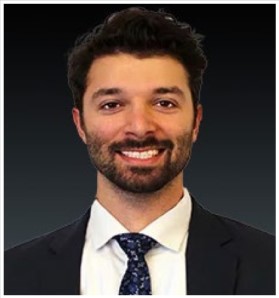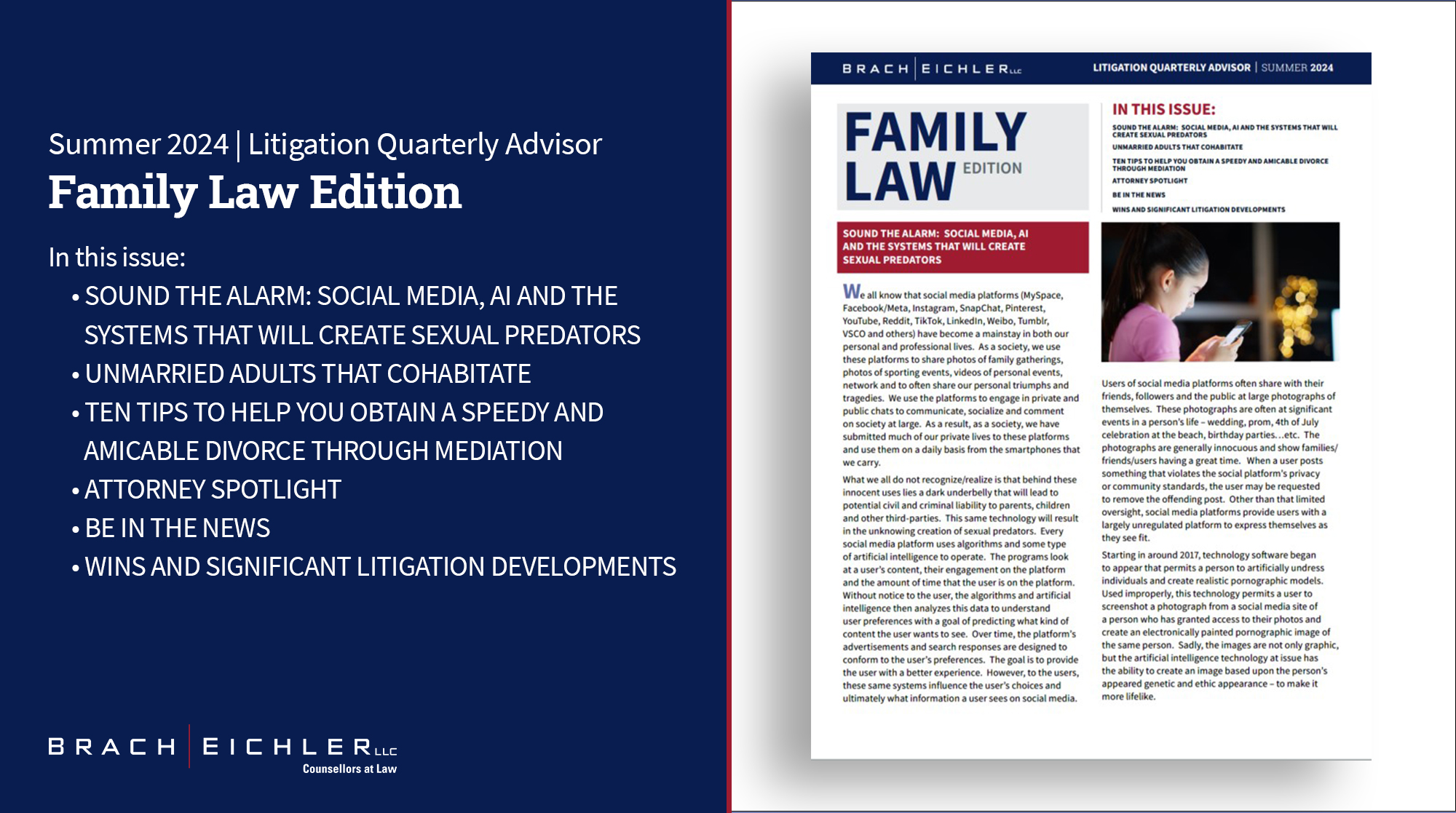

We all know that social media platforms (MySpace,Facebook/Meta, Instagram, SnapChat, Pinterest, YouTube, Reddit, TikTok, LinkedIn, Weibo, Tumblr, VSCO and others) have become a mainstay in both our personal and professional lives. As a society, we use these platforms to share photos of family gatherings, photos of sporting events, videos of personal events, network and to often share our personal triumphs and tragedies. We use the platforms to engage in private and public chats to communicate, socialize and comment on society at large. As a result, as a society, we have submitted much of our private lives to these platforms and use them on a daily basis from the smartphones that we carry.
What we all do not recognize/realize is that behind these innocent uses lies a dark underbelly that will lead to potential civil and criminal liability to parents, children and other third-parties. This same technology will result in the unknowing creation of sexual predators. Every social media platform uses algorithms and some type of artificial intelligence to operate. The programs look at a user’s content, their engagement on the platform and the amount of time that the user is on the platform. Without notice to the user, the algorithms and artificial intelligence then analyzes this data to understand user preferences with a goal of predicting what kind of content the user wants to see. Over time, the platform’s advertisements and search responses are designed to conform to the user’s preferences. The goal is to provide the user with a better experience. However, to the users, these same systems influence the user’s choices and ultimately what information a user sees on social media.

Users of social media platforms often share with their friends, followers and the public at large photographs of themselves. These photographs are often at significant events in a person’s life – wedding, prom, 4th of July celebration at the beach, birthday parties…etc. The photographs are generally innocuous and show families/friends/users having a great time. When a user posts something that violates the social platform’s privacy or community standards, the user may be requested to remove the offending post. Other than that limited oversight, social media platforms provide users with a largely unregulated platform to express themselves as they see fit.
Starting in around 2017, technology software began to appear that permits a person to artificially undress individuals and create realistic pornographic models. Used improperly, this technology permits a user to screenshot a photograph from a social media site of a person who has granted access to their photos and create an electronically painted pornographic image of the same person. Sadly, the images are not only graphic, but the artificial intelligence technology at issue has the ability to create an image based upon the person’s appeared genetic and ethic appearance – to make it more lifelike.
As parents, we need to be aware that the use of social media has and will continue to expose our children to these algorithms, artificial intelligence and readily available software. The use of this software will result in civil lawsuits being filed against parents and other supervisors of the children for negligence, defamation and other privacy torts. It will also likely result in attempted criminal charges being brought by end users of the software and those who view the images. If we continue to provide our children with access to smartphones and fail to adequately monitor the use of the software on those phones, our children will both be victims of the image creation, but also fall victim to the social media platform’s purposeful direction of their use. If as parents, we continue to provide our children with unmonitored use of “Apple Pay” or “Google Wallet”, our children will continue to be able to pay for, with a simple click, the use of this software. And, sadly, if we do not immediately become engaged, we will send our young children — unarmed and unaware – into a dark world wherein they may find it normal or appropriate to create these types of images of their neighbors, friends and your children. Ultimately, we will have allowed our own children to use this software to become predators to other children.
So, what do we do? Do not fall victim to the “keep up with the Jones’s” mentality. Do not provide your child with a smartphone until your child is of such an age that you believe they should be exposed to this software. Do not permit your child to access social media platforms without significant parental oversight – if you are not able to provide that oversight, do not allow them to download the software. Monitor and limit the applications that your children can put on their phones. Do not provide your child with “Apple Pay” or “Google Wallet” without creating parental protections for the use. Access their phones daily/weekly and view the photos that they have stored on the phone. And, finally, do talk to your children about this invasive technology, the risks associated with its use and how they want to project themselves to the world. You may find that by having these conversations with your children will save you the pain and anguish of having to address the results discussed.
To read more about this subject please click here.
For more information, contact:
Sean Smith | 973.364.5216 | ssmith@bracheichler.com
Many couples decide to enter into a cohabitation agreement or a formal agreement to memorialize their relationship rather than formally marry. Others decide not to enter into an agreement and opt for the “let’s take a chance and see what happens” route. Either way, these decisions have implications and consequences. Unless you legally marry, you are unmarried in New Jersey, despite the fact that you may live together, share assets, have children, commingle your finances and hold yourself out as a married couple.
There are positives to this type of relationship, one of which, is the simplicity of dissolving this type of relationship. If there are no children, and no agreements have been entered into, the parties can simply walk away, without going through the formal divorce process. However, there are drawbacks. Couples can acquire rights and protections similar to those of married couples. One such right may be palimony where one spouse may be required to support the other after the break up. Cohabitation is an indispensable element to sustain a palimony cause of action. Cohabitation requires setting up a household together and the cohabitation announces to the innocent partner and maybe children, that the parties have entered into a ‘marital-type’ relationship. Also, important is the length of time the parties have been in this relationship. Without a written contract, when both parties walk away, there is no obligation to support each other. If either party does not want to risk the potential for palimony, then they must not enter into any contract that promises support. The parties should not use the same last name or portray themselves in a public like marriage.
Another risk arises when the parties acquire property together. For example, they may acquire a home together, or open joint bank accounts, or commingle assets and do so without careful record keeping. The cohabitation home can be subject to a partition action, where one party may own the home, but the other has lived in the home for years, supporting the home both financially and with effort or “sweat equity.” When the couple breaks up, the non-owner may seek to establish rights in the property and bring an action know as partition. A claim for partition by an unmarried adult against the other requires two unmarried but

cohabitating people who engage in a joint venture to buy property where they both reside. If the relationship dissolves they can seek partition of that property. A formal agreement is not necessary. To establish a joint venture, the party will need to show some evidence of contributing money, effort, property, skill or some other asset; a joint property interest; some mutual management or control an expectation of profit or the right to participate in profits.
In a cohabitation agreement, a couple can reduce to writing whether they agree to support following a break up or whether any property they require is a joint venture. These agreements may look similar to a pre-marital agreement and can often be the precursor to one if the couple believes they may ultimately marry. If the couple engages in efforts to memorialize their relationship in writing it is wise to retain counsel.
An unmarried couple may also need to consider other issues. Unmarried couples cannot make healthcare decisions for the other. If a couple sets up bank accounts together, the unmarried partner cannot make financial decisions for the other if necessary without a power of attorney. Unmarried couples do not automatically inherit from the other partner if one partner dies. Children born during a marriage are presumed to be offspring of the married couple. This gives both parents a legal obligation to support the child. If the couple is unmarried, but cohabitating, and a child is born, paternity is not assumed for the biological father. Only when paternity is established the father has the obligation to support the child.
Unmarried couples likely believe that by not marrying they avoid the pitfalls of a complicated divorce if there is a decision to break up. It is best to consider a cohabitation or relationship agreement so that the issues can be discussed and agreed up in writing so that both parties know and understand their rights before moving forward. For more information or you are contemplating moving in with your significant other, contact Carl J. Soranno, Esq to discuss your rights or to answer any questions you may have.
For more information, contact:
Carl J. Soranno | 973.403.3127 | csoranno@bracheichler.com
1. Consider mediation with an experienced, retired Family Law Judge.
2. Make a list of the issues are you trying to resolve: Custody? Parenting time? Child support? Distribution of assets? Spousal support?
3. If custody and parenting time are issues, focus on your children first. DO NOT put them in the middle or discuss the process with them. Just remind them how much you love them always.
4. Make a list of all your assets and liabilities owned jointly or separately: bank accounts, pensions, retirements and 401K accounts, marital and vacation homes, automobiles, or other assets and liabilities as well.
5. Know your goals: how much do you need to live on after the divorce? Consult with lawyers, financial planners, and if necessary forensic accountants before you engage in mediation so you have a clear picture of what you have now and what you need in the future.
6. Make a date to mediate once you have all the information outlined above. Ask the mediator for a pre mediation Zoom call to identify outstanding issues and understand the mediation process.
7. Prior to mediation, send a proposal for resolution to the mediator and if you agree to do so, share that proposal with your spouse or spouse’s lawyer.
8. Attend mediation with an open mind, willing to listen, compromise and adapt your plan, to get to the goal of a speedy and amicable divorce. Mediation likely might take several sessions.
9. Be prepared to bend or be flexible on what are not your most important points. Understand where you are willing to compromise. The goal is a fair, amicable and speedy divorce which will benefit both parties and any children.
10. If an agreement is reached at mediation, ask your lawyer to draft a “Term Sheet” or a “Marital Settlement Agreement” to be signed by both parties and submit to the court for an “uncontested divorce.”
For more information, contact:
Lisa F. Chrystal, P.J.F.P.(Ret) | 973.364.8359 | lchrystal@bracheichler.com
New Jersey has taken a significant step towards protecting victims of sexual violence, stalking, and cyber-harassment with the implementation of the Victim’s Assistance and Survivor Protection Act (VASPA) in January 2024. VASPA expands the scope of civil protective orders, providing a crucial safeguard for survivors who may not qualify for help under domestic violence statutes. VASPA builds upon the protections offered by the previous Sexual Assault Survivor Protection Act (SASPA) of 2015. While SASPA addressed sexual assault, VASPA widens the net to include stalking and cyber-harassment. Sexual offenses covered under VASPA include any nonconsensual sexual contact, sexual penetration, lewdness, and any attempt of such behavior, stalking and cyber harassment.
This broader scope allows survivors of these acts to seek civil protective orders, even if the perpetrator was not known to the survivor prior to the act. This is an important aspect of VASPA, as it allows victims to seek a protective order that do not meet the criteria for a domestic violence restraining order. In order to seek a domestic violence restraining order, the perpetrator must be a current/former spouse, have had a current/prior dating relationship with the victim, have a child in common with the victim, or a current/prior household member. Prior to SASPA and VASPA if the perpetrator was a co-workers, neighbors, or strangers, the victim could not to obtain a protective order without a criminal charge or conviction in place. As with those seeking a restraining order under the Prevention of Domestic Violence Act (PDVA), survivors can apply for a civil protective order under VASPA regardless of whether they choose to report the person who caused them harm to law enforcement.
Survivors or the parent or guardian of a survivor can apply on behalf of the survivor if the survivor is under 18 or has a developmental disability. The application is filed in the
Chancery Division – Family Part, and thus the matter is adjudicated by a Family Part Judge. However, where the perpetrator is an unemancipated minor, the survivor will need to proceed in Juvenile Court.
Survivors can file for a protective order, under VASPA, at the courthouse during normal business hours, in

the county in which they reside, in the county where the sexual offense occurred, or in the county where the perpetrator resides. Survivors can also apply electronically, through the Judiciary Electronic Document Submission (JEDS). If filed in the courthouse during regular business hours, the application will be heard the same day or as soon as practicable. If the application is filed electronically, on JEDS, during normal business hours, the hearing will also take place the same day. However, applications filed after 4:00 p.m. or on a weekend or holiday, will be contacted the next business day and be informed of the date and time of the hearing.
The protective order process, under VASPA (as it was under SASPA and for protective orders under the PDVA), is a two-step process. The process requires speedy filing with the court and it would be best to consult counsel.
The benefit of obtaining a final restraining order is that it protects the victim from further sexual offenses, stalking and cyber harassment from the perpetrator. It also prevents the perpetrator from contacting or seeing the victim. Any violation, by the perpetrator, of the final restraining order is a contempt of the order, which is a criminal act in New Jersey.
For more information, contact:
Carl J. Soranno | 973.403.3127 | csoranno@bracheichler.com
Sean Smith | 973.364.5216 | ssmith@bracheichler.com
The summer before sending your child away to college for the first time is hectic. There is a seemingly endless checklist of things to buy, appointments to schedule, and forms to fill out. One more thing to add to your list before your new freshman moves into the dorm – a Designation of Healthcare Agent form.
What is a Designation of Healthcare Agent form and why is it needed?
If your child is already 18, you may have noticed that your access to their medical records has been restricted because they are legally an adult. The only way to access your child’s medical information now is if they share it with you. If your child still lives at home with you, this is easy. But what happens if your child is away at college and you need to access their medical records, or worse, they have a medical emergency? This is why they need a Designation of Healthcare Agent form.
The Designation of Healthcare Agent form allows your child (who is over 18) to name an “agent” who will always have access to their medical records and who can make
healthcare decisions for them in the event that they cannot. The form can list one or both parents as the child’s agent and remains in effect unless and until the child revokes it. The Designation of Healthcare Agent form works best when it is signed before it is actually needed. The best course of action is to have your child sign one as soon as they turn 18, keep the original in your files, and to put a copy on file with your child’s medical providers.
What other forms should your 18 year old sign?
It may seem impossible to you, but your 18 year old child is a legal adult. If they were to become incapacitated, you would not be able to access their financial or digital accounts. For this reason, you should consider having your child sign a Durable Power of Attorney naming you as their attorney-in-fact, which would allow you to access these accounts. A Durable Power of Attorney would remain in effect unless and until your child revokes it. It could also be beneficial to have your child sign a simple Will to appoint an estate representative. In the unfortunate event of your child’s death, having even a basic Will would greatly simplify the probate process.
If you are interested in learning more about the Designation of Healthcare Agent form and where to find it, please contact:
Amy Van Fossen | 973.447.9675 | avanfossen@bracheichler.com
Get to know the faces and stories of the people behind the articles in each issue. This month, we invite you to meet Counsel Hon. Lisa F. Chrystal and Associate John Simeone.
 HON. LISA F. CHRYSTAL
HON. LISA F. CHRYSTAL
The Honorable Lisa F. Chrystal (Ret.) joined Brach Eichler after serving 22 years as a Judge of the New Jersey Superior Court. Judge Chrystal concentrates her practice in the areas of Alternative Dispute Resolution (ADR), mediation and arbitration, as well as discovery management. A compassionate and attentive listener known for her legal acumen and her responsible and equitable counsel, Judge Chrystal focuses on civil cases and family law matters, prejudgment and post judgement, as well as custody and parenting time and the resolution of disputes through mediation, typically a more amicable and cost effective approach than litigation. Judge Chrystal also conducts mock trials to assist lawyers in trial preparation. Judge Chrystal’s clients benefit from her range of experience drawn from her tenure on the bench, her prior civil experience, litigation and family law practice, and her comprehensive knowledge of the myriad issues that arise in civil, equity, and family dissolutions and custody disputes. On the weekends, Judge Chrystal loves practicing yoga, going to the theater and traveling, as well as spending time with her family.
 JOHN SIMEONE
JOHN SIMEONE
John Simeone focuses his practice on litigation. His experience spans across multiple practice areas including trusts and estates litigation and employment litigation. Prior to joining private practice, John clerked for the Honorable Jose L. Fuentes in the Superior Court of New Jersey, Appellate Division. During his clerkship, John drafted judicial memoranda and opinions to aid Judge Fuentes in resolving cases on his docket.
In his spare time, John likes to spend time with family and friends and try out new recipes with his fiancée. He also spends much of his leisure time playing sports, such as golf and basketball.

On May 20, Healthcare Law Member and Litigation Chair Keith Roberts, produced a podcast entitled “A Primer on the New FTC Non-Compete Clause Rule.”
On May 20, Employment Law Member Jay Sabin opined on NJ.com “What is a noncompete? What to know about them and the FTC’s recent noncompete ban.”
On May 20, Litigation Member Charles Gormally, opined in Green Market Report “Could rescheduling provide leverage for cannabis interstate commerce?” about how the move could provide fuel for more lawsuits around that restriction.
On May 10, Managing Member and Healthcare Law Chair John D. Fanburg as Moderator along with Healthcare Members Carol Grelecki, Keith Roberts and Employment Law Member Jay Sabin, presented a webinar entitled “FTC Adopts Final Rule Banning Workplace Non-Competes Webinar” and produced an alert entitled “FTC Adopts Final Rule Banning Workplace Non-Competes.”
On May 8, Family Law Member Sean Smith released an Alert entitled “Limit Posting Images of Your Children: NJ Supreme Court Declares Portion of the “Child Erotica Statute” Overbroad” about the New Jersey Supreme Court which declared a portion of the New Jersey “Child Erotica Statute” as overbroad and unconstitutional.
On April 16, Litigation Member Rose Suriano and Counsel Lauren Adornetto Woods, wrote a Litigation Alert entitled “Witness Coaching – A Prohibited Practice That Carries Significant Consequences for Both Attorney and Client.”
On April 2, Litigation Member Rose Suriano, produced a podcast entitled “Current Trends with Non-Compete Agreements.”
WINS AND SIGNIFICANT BRACH EICHLER LITIGATION DEVELOPMENTS
• Paul J. DeMartino Jr. successfully obtained a $7.6M judgment in favor of a group of orthopedic surgeons in a contentious business divorce with their former medical practice and partner. The multi-million dollar judgment came after a ten day arbitration hearing. In addition to succeeding on our client’s affirmative claims he successfully defended against counterclaims for breach of fiduciary duty and alleged violations of the New Jersey Trade Secrets Act.
• Konstantine Paschalidis successfully defended a $2 million breach of contract claim on behalf of a commercial landlord client brought by its insurance carrier in Nassau County Supreme Court. The carrier dismissed the action with prejudice after the firm filed a motion for summary judgment on behalf of the landlord.
• Rose Suriano and Robyn Lym successfully defeated a motion to dismiss the complaint in a $23 million breach of contract case pending in the Federal District of New Jersey they also successfully obtained an Order compelling the Defendant to produce, on an expedited basis, materials and information, claimed to be privileged and confidential by Defendant, after the Defendant refused to produce the documents. As a result of this favorable outcome early on in the case, Rose and her legal team can renew an application for an injunction to enjoin certain actions of the Defendant.

Attorney Advertising: This publication is designed to provide Brach Eichler LLC clients and
contacts with information they can use to more effectively manage their businesses. The contents
of this publication are for informational purposes only. Neither this publication nor the lawyers who
authored it are rendering legal or other professional advice or opinions on specific facts or matters.
Brach Eichler LLC assumes no liability in connection with the use of this publication.

Shannon Carroll | 973.403.3126 | scarroll@bracheichler.com
Matthew M. Collins | 973.403.3151 | mcollins@bracheichler.com
Riza I. Dagli | 973.403.3103 | rdagli@bracheichler.com
Charles X. Gormally | 973.403.3111 | cgormally@bracheichler.com
Anthony M. Juliano | 973.403.3154 | ajuliano@bracheichler.com
Bob Kasolas | 973.403.3139 | bkasolas@bracheichler.com
Thomas Kamvosoulis, Senior Editor | 973.403.3130 | tkamvosoulis@bracheichler.com
Andrew R. Macklin | 973.447.9670 | amacklin@bracheichler.com
Stuart J. Polkowitz | 973.403.3152 | spolkowitz@bracheichler.com
Anthony M. Rainone | 973.364.8372 | arainone@bracheichler.com
Richard B. Robins | 973.447.9663 | rrobins@bracheichler.com
Sean Alden Smith | 973.364.5216 | ssmith@bracheichler.com
Carl J. Soranno | 973.403.3127 | csoranno@bracheichler.com
Frances B. Stella | 973.403.3149 | fstella@bracheichler.com
Rose Suriano | 973.403.3129 | rsuriano@bracheichler.com
Hon. Lisa F. Chrystal, P.J.F.P.(Ret.) | 973.364.8359 | lchrystal@bracheichler.com
Mark E. Critchley | 973.364.8339 | mcritchley@bracheichler.com
Paul J. DeMartino, Jr. | 973.364.5228 | pdemartino@bracheichler.com
Autumn M. McCourt | 973.403.3104 | amccourt@bracheichler.com
Konstantine Paschalidis | 212.649.6065 | kpaschalidis@bracheichler.com
Michael A. Rienzi | 973.364.5226 | mrienzi@bracheichler.com
Thomas J. Spies | 973.364.5235 | tspies@bracheichler.com
Lauren Adornetto Woods | 973.364.5211 | lwoods@bracheichler.com
Robyn K. Lym, Editor | 973.403.3124 | rlym@bracheichler.com
Ashley Matias | 973.364.8330 | amatias@bracheichler.com
Aladekemi Omoregie | 973.447.9678 | aomoregie@bracheichler.com
Susan L. Schulman | 973.364.8333 | sschulman@bracheichler.com
John Simeone | 973.447.9665 | jsimeone@bracheichler.com
Arnold G. Sooklall | 973.364.5223 | asooklall@bracheichler.com
Roseland, NJ | New York, NY | West Palm Beach, FL | www.bracheichler.com | 973.228.5700



